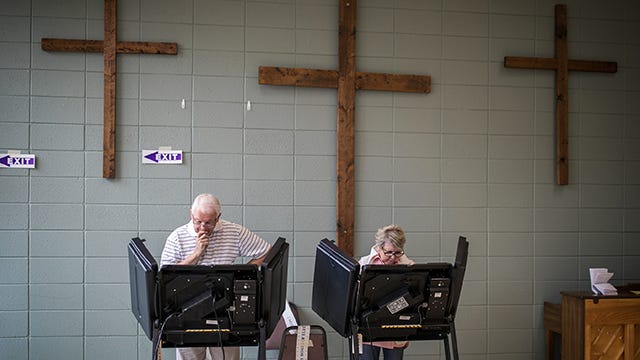A friend and I were recently discussing how to win people over politically, and this led surprisingly, or maybe not so surprisingly, to a brief discussion of religion. Every American is all too aware of the First Amendment and its mandate for the government to not establish a single, State-endorsed “religion.” Likewise, one would be hard-pressed to find a person unfamiliar with the phrase, “separation of Church and State.” Both of these are used by people to foment the idea that religion should play no part in politics. The problem is, religion cannot be separated from politics.
Realize, I am using the word “religion” here, not in the typical sense, of an organized group of people united around particular beliefs regarding deity (or rejecting the existence of any greater power), but rather, in the sense of beliefs held very strongly, to the point of being religious. For instance, “Covidianism” could be considered a religion. From 2020 through 2022, and even now to a lesser extent, people bowed to the Science™, wearing masks that studies showed didn’t work, taking shots that neither prevented contracting the virus nor transmitting it, staying six feet apart when for decades it has been known that aerosolized virus from a cough or sneeze can travel in excess of 25 feet and remain airborne for hours, and participating in many other rituals that benefited no one. Such behavior is not rational, it is religious.
Man-made Climate Change is another religion. Though scientists disagree to what extent (if any) human behaviors affect the earth’s climate, many have taken up the mantle of prophet to declare the end of life on the planet if we don’t banish bovine flatulence, stop heating homes with carbon-coughing coal, and eliminate gas-guzzling go-carts in favor of battery-powered buses. Adherents are religious in their pursuit of zero carbon emissions.
CRT adherents, “Wokeists”, abortionists, even atheists, are all religious people. While they may not meet on one day of the week to sing songs and break bread (or maybe they do), all of these systems of thought may be considered “religion.”
These beliefs, these strongly, dearly, adamantly held beliefs, drive us. They drive our daily behavior. They drive our interactions with others. They drive our politics. It is inescapable. What one believes will determine his or her pursuits, desires, actions, and attitudes. As such, these beliefs, these religions, will also influence voting. A person will vote for the candidates who promise to legislate according to that person’s beliefs; or conversely, a person will vote against a candidate who will likely legislate in a way that opposes that person’s beliefs.
Think about your own dogmas. Consider how they impact the causes you take up, the politicians you support, the candidates for whom you cast your ballot. Contemplate how the tenets of your faith propel your political inclinations. It won’t take long for you to conclude that your “religion” does in fact determine your politics. The two are inextricably interwoven, and no legislation or amendment can change that.





It was me I am that friend. But what Chad says is very true. NYS has had its closest gubernatorial race in decades. Many reports and polls show that abortion “rights” was the tipping point that drove the democrat party to a victory. And now that the election is over we’re right back to the same complaints. Something as simple as the firm belief that abortion will be outlawed period, no ifs ands or buts, allowed CRT, mandates, pro criminal bail reform, gun control, and countless other issues go rampant for another 4 years even though a vast majority of NYers have spoken out against all of these issues.
Spot on, and well said.